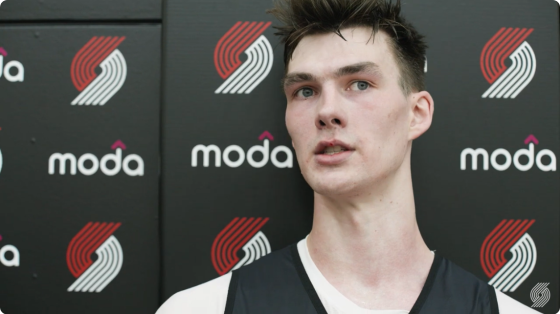Before referee Zach Zarba would lob the ball in the air for the opening tip on Sunday, Al Horford walked down the court toward what would be Brooklyn’s basket in the first half, stopping just beneath the cup. With the crowd already in mid-postseason form, charged and animated like it was prepared to witness a game seven-esque battle, Horford reached up, grabbed either side of the net, leaned his head, and closed his eyes.
A subtle grin (and I mean subtle, as most things are with Al) appeared, as though he felt the energy swell within him. Never mind the fact that it was merely Game 1; “I mean, it’s the playoffs,” he said postgame. “Playing in TD Garden, it doesn’t get any better.”
The TD Garden crowd must not have received the memo upon entering the arena, that this game between the Boston Celtics and the Brooklyn Nets was, indeed, just the first of what could be a series that goes a maximum of seven games. Because despite how their vitriol toward the opposition’s point guard — the same one who once told them that he hoped to have his jersey retired alongside the other greats residing in the rafters — fueled him to a brilliant offensive display; despite the home team’s worst defensive performance since what feels like an eon ago; and despite a bevy of runs that would’ve convinced even the most optimistic fan that the Nets might have the upper hand, the Celtics would escape, taking the first game of the series, 115-114.
They’d escape thanks to the crowd. Thanks to trust in each other, and the trust their coach had in them. Thanks to a game-winning possession that rivals Boston’s best of the season. And thanks, in large part, to the trusty vet who came back for another ride in Beantown and saved his best performance for the time his team may have needed him to offer it the most.
Celtics head coach Ime Udoka put the 15th-year big man’s 20-point, 15-rebound performance succinctly, and as best he could: “Al was Al. He does it all the time.”
The story of the game, naturally, will be the way Boston fended off an all-time performance from Kyrie Irving, whose 39 points on 60 percent shooting from both the field and from deep led all scorers not just on Sunday, but through the playoffs thus far. Yet what the Celtics may walk away from Sunday highlighting the most is Horford’s performance, a subtle yet vital all-around effort that may have been the key to Boston staving off a Game 1 loss.
“It’s a learning experience for our group,” he said after the win. “I know that we’ve all had playoff experience in the past but it’s the first time that this group is together, first playoff game against an extremely good team. The biggest thing is the composure. We continued to stay with it, and that’s what we did.”
Early on, with Boston struggling to buy a clean look — and failing to knock down the few clean looks they could realistically get — Horford didn’t hesitate to take the shots he’s used to knocking down. He led the team in scoring midway through the first half, and though he’d finish tied for third in the Boston box score, his production was easily the most tangible early on. Jaylen Brown wasn’t hitting at his typical clip out of the gate, and Tatum had just four points, all at the line, in the first quarter. So, on a day when bench contributions were modest at best, and when the offense wasn’t necessarily free flowing, it was Horford who stepped up.
Horford was perfect from three, despite taking just two shots from deep, and was remarkably efficient from inside, shooting 61.5 percent for the game. He reacted accordingly to the occasional mismatch, knowing when to back down a smaller defender like Seth Curry, and when to kick it out to a teammate in position to create. In every way, it was peak Al Horford: decisive, measured, and methodical, all while still being as purposeful as the Celtics’ offense needed him to be.
Though Celtics fans have gotten used to seeing orderly outings from Horford — even the most high-scoring nights feeling almost ho-hum in their existence, hardly leaving the footprint of a 20-point performance from a Tatum or Brown — there has hardly been a Horford performance quite like this, and certainly not since his return to Boston. This felt much more like Atlanta Al, when he was leading an efficient Hawks offense that wasn’t going to win any titles, but was bound to give other contenders fits.
While watching him work, particularly in the first half, I was reminded of the Horford I became enamored with back in 2013 or so, when he was averaging career-highs across the board and assuming the rule of the engine on both ends. He’s never had to do that in Boston, mainly because it’s never been asked of him. The moment he was called upon to summon vintage Al, though, he came through in an indelible way.
Horford was, for all intents and purposes, machine-like on the offensive end. He pulled down six offensive rebounds, turning two of them into putback buckets; at one point in the third quarter, ESPN’s Mark Jackson said to Jeff Van Gundy, “He’s just too big, coach.” Not a line typically applied to the 6-foot-9 forward-center hybrid, who often makes himself bigger than he actually is thanks to his hulking frame and wide elbows, but he fit the description Sunday.
Horford also deployed a quick trigger, especially on the aforementioned triples, both of which came in the first quarter. In the end, that effort amounted to just his fourth 20-point performance this season and his first since March 3. It bears repeating: he hasn’t had to have his number called for a big offensive performance much in Boston, but last night, he proved he’s able to bring it when it’s needed most.
Defensively, Horford was as much of an anchor as he tends to be for the Celtics. He spent just 2:23 total defending Kevin Durant (1:30) and Kyrie Irving (0:53) — far less time than he spent guarding Bruce Brown, Nic Claxton, and Andre Drummond — but was a force in holding Durant to three-of-seven shooting during those minutes. Horford was also a key cog in Boston’s final defensive possession, when he and Marcus Smart rushed Irving, forcing him to divert from his presumed initial plan (a shot) and pass to a teammate (Durant) who was being blanketed by Jayson Tatum.
If Horford doesn’t double Irving, who knows what happens; sure, Smart is a Defensive Player of the Year finalist and an elite on-ball defender, but Irving was riding a heater unlike many he’s experienced in recent memory. A one-on-one matchup would’ve been ideal for Kyrie; Horford made that impossible.
Though the night ended up toggling back and forth between belonging to Irving and then, with his game-winning shot, to Tatum, it was arguably Horford whose impact on the game will be the most lasting should Boston win this series. They don’t win without Tatum’s layup or Smart’s pass, but they also have the option to go for a layup without Horford’s presence of mind to double the game’s best player as he looks to cap off his storybook night with the ultimate coda.
With the moment the biggest, the lights the brightest, and the crowd the loudest, the person you often need to call on is the one who can tune that all out and just play. The kind of player who begins the evening by tuning out the noise, grabbing either side of the net, and closing his eyes.






